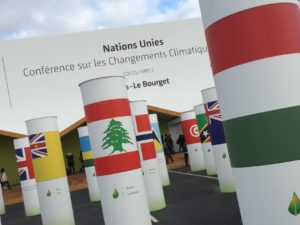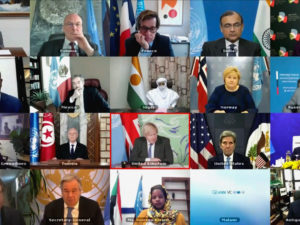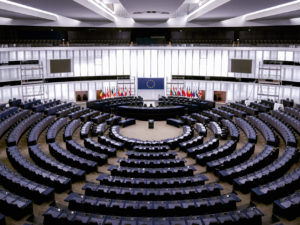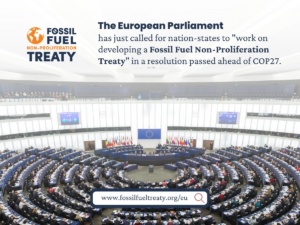
CCI statement on geopolitical, socio-economic, and geophysical context for Stockholm+50
Our fate is linked to the health of nature. The window for climate resilient development is closing. Failure means a world riven by deprivation, displacement, and conflict. As a network of stakeholders across six continents, we recognize the right of all people to a future free from harm. That right is under threat, from a triple planetary crisis of worsening climate disruption, accelerating loss of biodiversity, and pervasive pollution. The COVID pandemic, climate disruption, and conflict all worsen inequality and vulnerability. We must raise ambition, expand and activate civic spaces, and mainstream sustainable finance, to secure a livable future.
It has been 50 years since the 1972 United Nations Conference on the Human Environment and the Stockholm Declaration.
- The UN Environment Programme now operates year round, around the world to bring strong, evidence-based environmental law and justice to the world.
- The Rio Conventions, agreed in 1992, have established biological diversity, combatting desertification, and addressing climate change as global political and diplomatic priorities.
- The right to a healthy and clean environment has now been formally recognized by the UN Human Rights Council.
- We now have deep, detailed understanding of environmental threats to human security and the need to actively realign our economies to build resilience for eveyrone.
The stakes, at this moment, could not be higher.
- According to the World Food Programme, more than 280 million people in 81 countries currently face acute food insecurity or are at high risk, while 45 million are on the brink of famine. Hundreds of millions more live in countries that are heavily dependent on direct food imports or food system inputs from Ukraine or Russia.
- Food prices are already higher now than they were in 2011—when food prices sparked popular uprisings across the Middle East and North Africa—and are projected to rise another 20% or more in the coming months. Dozens of nations could see civil unrest if food supplies cannot be secured and global inflation eased.
Energy costs and supplies are another area needing urgent attention.
- Dependency on combustible fuels, traded through commodities markets, has allowed hostile regimes to manipulate prices for targeted geostrategic aims, making recovery from COVID recession harder to achieve and less equitable.
- Expanding fossil fuel supplies to meet energy needs and reduce prices might fail to provide the short-term benefit needed to slow price spikes in food and other daily needs, and scaling up combustible fuel production could lock in devastating climate resilience failures later on.
Scientific findings from the IPCC clearly show we have very little margin for error.
- Of five future emissions scenarios, only in the most ambitious, with immediate, universal, and sustained decarbonization efforts, can we hold global heating to 1.5ºC this century.
- We have already lost the most efficient climate resilient development pathways, and climate impacts are now pervasive; the remaining window is closing fast, and the wellbeing of billions depends on our getting through that window to safety.
Sustainable development is not only about the sustainability of ecosystems and nature; it is also about building the foundations for inclusive shared prosperity, while reducing threats of violence, tyranny, destabilization, and displacement. Strong institutions that are open, transparent, and which operate in service of all people are necessary for building trust, countering extremism, and ensuring even small, remote communities are able to enjoy sustainable human development.
Ultimately, the social contract can only hold when it provides a useful and relevant fabric of health-building everyday experience. When food and water are scarce or unaffordable, and life itself is under threat, societies come apart. As Costa Rica noted during yesterday’s Stockholm+50 Preparatory Meeting at UN Headquarters:
“Without a healthy planet, there is no life, and without ecosystem services, there is no economy.”
Right now, today, the world faces an unprecedented choice of immeasurable consequence:
- We must actively and consciously accelerate sustainable development efforts, to steer the world to a low-carbon development model that includes everyone, and this acceleration must shield the least vulnerable from threatening price rises, now.
- If we choose business as usual, we will lock in future climate emergency and persistent, pervasive hunger and destabilization.
The new Global Crisis Response Group on Food, Energy, and Finance, has been set up to tackle this moment of existential choosing.
- First and foremost, we need to feed the hungry and protect the vulnerable.
- Next, we need to decouple food systems from the gamble of energy commodities that also drive climate disruption and accumulating risk and cost.
- We need to harness the incomparable rate of energy return of advanced solar systems, and make that low marginal cost business model available to the most vulnerable.
- We need strong, directional price signals to steer whole economies away from pollution toward clean, renewable, distributed, and circular business models.
- We need to value vulnerability (and so resilience), and act to ensure our industrial endeavors honor and protect defenseless people and natural systems.
We need to stop the flow of plastics and chemical pollutants into waterways and marine ecosystems. It is projected there will be more plastic than fish in the sea by 2050, and micro plastics are now being found throughout the marine biosphere. Last week we learned microplastics were found in human blood for the first time.
Finance needs to have an operational understanding of the macrocritical resilience value of specific decisions. How will a given investment, pricing decision, new market, or trade priority, influence our climate future, global food security, the resilience of biodiversity and ecosystems, or the security of the marine biosphere from plastic and chemical pollution?
The health of planetary systems shapes and affects our own access to health, resilience, and sustainable thriving. In 2022, 50 years after Stockholm, we must connect the urgent need for transformation of food, energy, and financial systems, to the Rio Conventions on biodiversity, desertification, and climate, and to all 17 Sustainable Development Goals.
We have a chance to reinvent prosperity, protect the vulnerable, and mobilize the best of humanity. We cannot afford to miss this chance.








